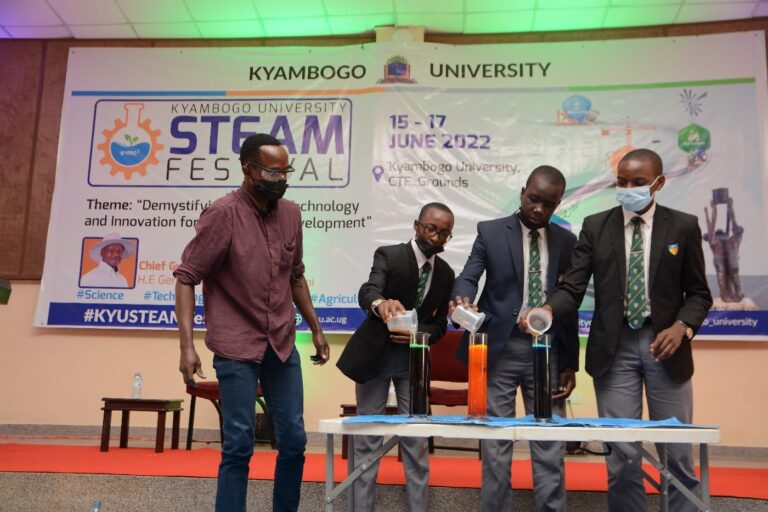Kyambogo University has created a venue where students can present their ideas and perspectives on addressing the climate emergency through STEAM Festival and here is the 2024 one.
In the third edition of the STEAM (Science, Technology, Engineering, Art, and Mathematics) Festival which took place from April 24 to 26, 2024, students featured contributions to climate change through panel discussions, quick presentations, and exhibitions.
This comes at a time when people are looking for workable answers to the climate change issue, both in Uganda and around the world. Kyambogo University student Peter Kato, pursuing a bachelor’s degree in science and technology, devised a method for turning plastic bottles into items such as fuel.
“This provides an alternative fuel at an affordable price while addressing the problem of plastic pollution,” Kato said. He added that, used bottles are heated, condensed and purified to come out with the final product of fuel, sulphur, mercury and natural gas as the byproduct.
Sean Rukabwe, a student from the faculty of biological science has developed polythene bags made from cassava and other starch foods which decomposes faster in soil and will minimize pollution caused by plastics. According to the World Health Organisation report, climate change is responsible for 150,000 deaths per year and is expected to double by 2030.
Dr. Dick Kamugasha, Deputy Director of Uganda Industrial Research Institute said that the United Nations Climate Change Conference (COP28) that was held in the United Arab Emirates (UAE) in December 2023 marked the start of the end of the fossil fuel era. And for the first time, the summit set the world on a course towards quick and equitable transition from fossil fuels.
“There isn’t any country in the world which is not experiencing some effect of climate change, climate change affects the whole world,” Kamugasha remarked. He made the remarks on Thursday, April 25, 2024, during the official opening of the STEAM Festival 2024 at Kyambogo University Central Teaching Facility in Kampala.
Kamugasha said that for this change can only happen, if National governments ought formulate policies to decarbonize the world Energy system.
Call for action
Flavia Nakabuye, founder of Fridays for Future Uganda said that climate change is humanity’s biggest challenge and the world is way behind schedule in combating it. Fridays for Future Uganda is a nongovernment organisation that focuses on environmental conservation.
“Uganda and Africa as a continent receive sunlight throughout the year, lets use the God-given resource to be able to lead the just transition we need from fossil fuels,” Nakabuye remarked.
Given that fossil fuels account for 90% of emissions that contribute to climate change, Nakabuye argued that fossil fuel businesses shouldn’t be granted operating subsidies or exemptions. Emissions that were emitted a century ago are harming us.
In the Paris agreement, Uganda pledged to create all clean and efficient energy by 2030, but with the country’s upcoming extraction activities in Western Uganda, Nakabuye said Uganda will not meet this goal.
Nakabuye stated that Agriculture is backbone of Uganda and we should invest in Agriculture, fisheries, and tourism that have held Uganda for years, reflecting on how the oil and gas sector has devastated the Nigerian economy.
“There is no business that can happen on the dead planet. Think about the people in the communities who are bearing the grunt of climate change. The world is on the brink of extinction we should open our eyes,” Nakabuye reiterated.
Approximately 6.5 billion barrels of oil reserves were discovered in Western Uganda, with at least 1.4 billion dollars estimated to be economically recoverable. Dr. William Wanasolo, an engineering lecturer at Kyambogo said that the perfect solutions to global warming should be parallel.
“The most plausible solution should be on the excess carbon dioxide, how can we capture it and make use of it,” Wanasolo pointed.
“In the recently concluded COP28UAE, the solutions offered were mostly social. Petroleum and gas is a business, you can’t tell businessman to abandon a lucrative business and another to avoid it. Business is Business,” Wanasolo added.
Wanasolo mentioned that his department has embarked on a project on carbon dioxide capture, where they are capturing excess carbon dioxide to use in industry to make produce other industrial components such as medicine.
Although Agriculture contributes to global warming, Wansolo highlighted that petroleum carbon dioxide is more dangerous because it is obtained from underground and is a foreign body on the surface, which makes it a key component and singular destroyer of the environment.
“It’s a myth to think fossil fuels will be eliminated, there is no country that will discover oil and wont exploit it. The business is so lucrative that any country that has entered will not leave,” Wanasolo said.
Wansolo urged members of the public to participate in the measures to eliminate climate change, and said that the challenges from fossil fuels are for everyone whether you participated in creating the problem or not.
Oil in commercial quantities was discovered in Uganda in 2006, until 2022 when president signed final investment decision, in that period there was propaganda from western world to stop Uganda from removing oil out the ground.
Lawrence Songa, chair of the Climate Change Committee of Parliament called it hypocrisy for developed countries to advise against extraction of oil yet they continue to profit from it while Uganda remains burdened by high fuel prices.
However, he said that Uganda is working to reduce emissions of house gases by 22 percent by 2030 in line with its commitment to the Paris Agreement. It was updated to 24.7 percent.
“We are working with everybody will all ministries of government, civil society, private sector, and academia their views will included in our report and presented on the floor of Parliament. And at Parliament level, we have done our part to ensure we have the Legal framework, we have the climate change law in place and reviewed the national environment act,” Songa said.
Songa added that, at the end of the Paris Agreement, Developed countries committed 100bn Dollars to combat climate change in the developing world including Uganda, but only 2 percent of this money has been received.
Dr. Ann Nakagiiri, Acting Chief Research Grants Office said that STEAM Festival offers a platform to demystify complex research innovations and present them in a simple understandable way to the public, as she stood in for Kyambogo University Vice Chancellor Prof. Eli Katunguka.
Festival stands as a testimony to our unwavering commitment to innovation, discovery, and pursuit of knowledge. In today’s times that have marked unprecedented challenges, the importance of science and research has never been more imminent. This is from combating the global pandemics and diseases to addressing climate change challenges” Nakagiiri noted.
Beyond Kyambogo, Nakagiiri said the festival is a symbol of community commitment and outreach that provides an opportunity to share our discoveries, spark dialogue and inspire the next generation of scientists and innovators.
READ: Hon Rebecca Kadaga warns DR Congo About Visa Agreement With Uganda
She also highlighted the lack of funds for capital projects, research, and staffing and urged the government to provide greater assistance. Sarah Babirye Lubega Vice Chairperson University Council said that science and technology has always been at the forefront of progress and development it has revolutionized every aspect of our lives from transport and agriculture. Yet for many in our community, science remains a mystery and perceived as hopeless.
“We embark on the journey to change that perception that science is not only for the elite few but for everyone. As a university we Refirm our commitment to promoting scientific literacy and fostering the culture of innovation within our community,” said Lubega.
This year’s STEAM Festival was celebrated under the theme: Demystifying science, technology and innovation for Community Development Science technology and innovation are the key drivers for national development.
This festival provides a venue for showcasing and sharing innovative pedagogical interventions and research findings from multiple faculties.
The festival, so named because of its conferences, exhibitions, and panel discussions, has drawn people from outside as well as from a variety of colleges and organizations to learn about the latest advancements in science and other subjects.
Background
The STEAM Festival 2024 has been hosted by Kyambogo University for three years in a row and the first Festival took place on June 2022.

